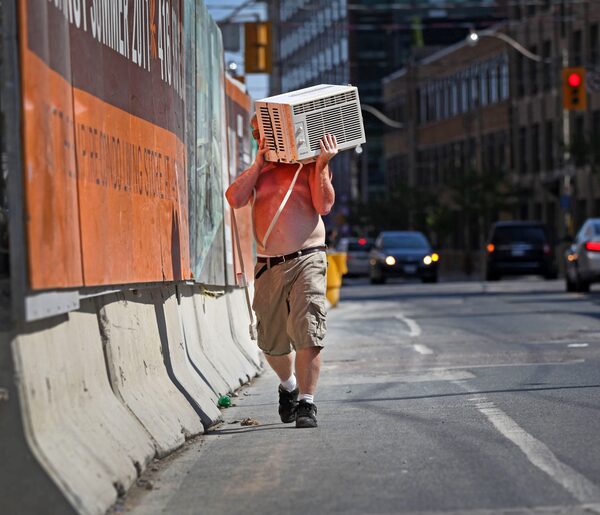Abdullah Shihipar is a Toronto-based freelance writer and an incoming masters student at Brown University’s School of Public Health.

A man, who did want to give his name, walks up Sherbourne Street with an air conditioner on his shoulder as temperatures in Toronto reached the low 30's July 19, 2011.Moe Doiron/The Globe and Mail
Last month, as a heat wave baked parts of the country, people flocked to beaches and neighbourhood pools in an attempt to seek respite from the stifling weather. But as the temperatures climbed so, too, did the death toll. In Ontario, three heat-related deaths were reported. In Quebec, the picture was far worse with more than 90 people dying from heat-related causes over the span of a week.
While the death toll in Ontario could be higher as the province has stricter definitions on what consists of a “heat-related death,” the staggering amount of lives lost in Quebec can be attributed to something more than just a difference in definitions. According to officials in Montreal, of the 53 people who died in the city, none of them had air conditioning in their places of residence. These numbers make one thing clear: With air conditioning, deaths could have been prevented.
As a result of climate change, temperatures across Canada have increased over the past few decades. Data collected by Environment Canada show that between 1961 and 2014, the temperature of Canada’s land mass increased by 1.6 degrees C. National summer temperatures are projected to be 3.5 degrees C higher between 2040-2070 than between 1981-2010. While Canadian cities have rules addressing extreme cold, they have yet to properly address the increasing danger from extreme heat.
Extreme heat can have detrimental effects on the body – heat exhaustion is common, with symptoms including headache and dizziness. Things can get much worse with the onset of heat stroke, which often brings with it unconsciousness and requires medical attention. People’s mental health can also take a toll in the heat; researchers in Britain for instance, found that there is a link between higher temperature and the frequency of suicides.
According to 2015 figures from Statistics Canada, only 53 per cent of households in Quebec have air conditioning, 83 per cent in Ontario and 57 per cent nationwide.
Despite the plethora of evidence demonstrating the need to keep people cool, housing regulations in Canada have yet to catch up. In Toronto for instance, landlords aren’t required to install AC systems. There are regulations for landlords who do have units with air conditioning; they must maintain a temperature below 26 degrees, but this is only if the rental agreement specifies the use of AC.
There have been moves to change the rules in Toronto. Last year, city councillors called for a review of the bylaws after a September heat wave left many tenants sweltering. Council subsequently passed a motion asking the city to review the bylaws, and this past May, the city’s licensing and standards committee delivered a report which, among other things, recommended the creation of a working group to look into requiring residences to have AC.
In Montreal, authorities noted that most of the people who died during this year’s heat wave were above the age of 50, lived alone and had existing physical or mental health issues. And a Toronto Public Health study in 2010 found that while 85 per cent of residents in the city have AC, the 15 per cent who don’t are more likely to be people who rent, immigrants, those classified as low income, living in community housing and those who have difficulty with transportation. As The Guardian noted in a feature about heat waves around the world, heat is becoming the next big inequality issue.
The city of Hamilton has proposed a potential solution; it’s looking into distributing air conditioners to people with low incomes who have pre-existing health conditions that are made worse by the heat. But this is not enough. As climate change makes weather patterns unpredictable, we can no longer rely on antiquated bylaws that don’t account for extreme temperatures. If we hold parents accountable when a child dies in a hot car, then surely we must make landlords responsible for the internal temperatures of their units.
Air conditioning isn’t a magical long-term solution to the problems we face from climate change – changing how we design buildings and addressing global emissions are far bigger issues – but it is a necessary step to mitigate the effects we are feeling at the moment. Extreme heat is a serious public health issue. It’s time we started treating it like one.